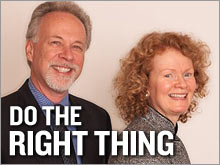|
What to do about freeloading co-workers When out to dinner with steak-eaters, how do you split the bill?
NEW YORK (Money) -- QUESTION: Ten of us go out to dinner after work once or twice a week, always splitting the tab equally. At a recent meal, eight people ordered dinners that cost $12 to $14, while two ordered $22.00 steak dinners.
When the check arrived, the steak eaters said nothing about paying a larger share of the bill. I know the amounts aren't huge, but shouldn't they have offered to pay $9.00 or so more than the rest of us? ANSWER: Absolutely. People split checks not only because it's gracious and convenient, but because they're operating on the premise that over time things even out. For that to work, though, the differences in the cost of the meals has to be relatively small - not the 50 percent gap you report. So unless the two steak eaters have been consistently ordering cheaper meals than the rest of you while paying a full share, they should have covered the extra cost of their much pricier dinners. As for your colleagues' silence when the waiter delivered the check, there are three kinds of folks who don't seem to notice they've run up a tab that's much higher than everyone else's: those who just can't do math, the clueless - and the freeloaders. Whatever accounts for your colleagues' ethical lapse, you can always ask them to chip in more money if they don't volunteer. In fact, if this happens again, you should. If the steak eaters are in the first two groups, they'll appreciate the reminder. And if they were counting on their co-workers to keep subsidizing their steaks, they'll realize the deal is off. _____________________________________ Recent responses: What's my obligation to rotten-apple nephew? Is it fair to spend more on a gifted son than his siblings? Can I get out of co-hosting a party I can't attend or afford? |
|

